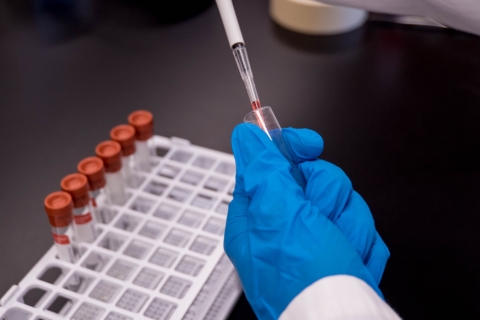What is precision medicine?
Imagine a world where you always receive tailor-made treatment the moment you’re ill. No overgeneralised diagnoses that apply to everyone, but truly focused on your personal and genetic characteristics. Tailor-made care. That is essentially what personalised medicine means.
The term precision medicine is a relatively new concept in medicine and life sciences. However, the concept and the idea behind it have been around for a long time. In this article, we inform you about what precision medicine is and what this innovation is used for.
What is precision medicine?
Precision medicine is an approach to healthcare that focuses on understanding each patient’s individual biology so that treatments can be better tailored to the unique characteristics of their disease. This is a contrast to traditional ‘one-size-fits-all’ treatments, which use the same treatments for all patients with a particular condition.
Within precision medicine, advanced technologies, such as genome sequencing and molecular diagnostics, are used to gather information about an individual patient’s genetic and molecular characteristics. Based on this information, doctors can recommend treatments specific to that patient’s needs.
Purpose of personalised medicine
The goal of precision medicine is to improve the effectiveness of treatments by taking into account a patient’s specific biological and genetic factors. For example, this approach has already led to pioneering treatments for cancer patients. Consider identifying specific mutations in tumours. This allows targeted therapies to be more effective for patients.
Traditionally, patients are treated based on their diagnosis, age and gender. This can lead to less effective treatments, as each patient has unique biological and genetic characteristics that can affect the effectiveness and safety of a treatment. Precision medicine tries to solve this problem by using advanced diagnostic techniques to get a better picture of a patient’s specific characteristics. The treatment method is then adapted accordingly. Unique to each person.
So in essence, this approach aims to provide more effective and efficient treatment for each individual.
Personalised medicine has been around for some time.Personalised care or personalised treatment plans is not new in medicine. It has existed for some time. Consider a person who needs a blood transfusion. This person does not just get blood from a random donor. Instead, the donor’s blood type is matched to the recipient to reduce the risk of complications.
Although examples can be found in various fields of medicine, the role of precision medicine in everyday healthcare is relatively limited. Researchers hope this approach will expand to many areas of health and healthcare in the coming years. In February 2023, then, there was a real breakthrough in precision medicine. A study found that the use of DNA profiling reduced serious adverse drug reactions by 30 per cent. A good example of the power of precision medicine.
Application of personalised medicine
Personalised treatments are increasingly applied within healthcare. An important application of this can be seen in cancer treatment. Today, cancer patients are treated based on the type of cancer they have and how far the cancer has progressed. However, using precision medicine, doctors can identify the specific genetic mutations in a patient’s cancer cells and develop a tailor-made treatment targeting these mutations. This can significantly improve the effectiveness of treatment and reduce the risk of side effects.
Another example of precision medicine is the treatment of hereditary diseases. Through genetic testing, doctors can identify the specific genetic mutations responsible for an inherited disease. This can help develop treatments that target these specific mutations and may also help prevent the development of the disease in future generations.
Not just focused on treatment
Precision medicine is not only used to treat sick people. There are many other situations where this innovative method of care comes into its own. As in:
identifying individuals at risk before the disease strikes predicting which prevention strategies will work best and for whom recognising earlier signs before symptoms appear
spotting possible variations of diseases that are at first glance the same but respond differently to a type of treatment conducting tests to investigate the heritability of a disease for future children
Want to know more?
This blog is an introduction to precision medicine. With the Life Sciences Academy, you can get started on this, among other topics. With the Life Sciences Academy, you will spend two years learning everything you need to kickstart your career and excel as a versatile professional. Contact us for more information.

Gepersonaliseerde geneeskunde bestaat al langer
Zorg op maat of persoonlijke behandelplannen is niet nieuw in de geneeskunde. Het bestaat al enige tijd. Denk aan een persoon die een bloedtransfusie nodig heeft. Deze persoon krijgt niet zomaar bloed van een willekeurige donor. In plaats daarvan wordt het bloedtype van de donor afgestemd op de ontvanger om het risico op complicaties te verminderen.
Hoewel voorbeelden te vinden zijn in verschillende gebieden van de geneeskunde, is de rol van precisiegeneeskunde in de dagelijkse gezondheidszorg relatief beperkt. Onderzoekers hopen dat deze aanpak de komende jaren zal uitbreiden naar veel gebieden van gezondheid en gezondheidszorg. In februari 2023 was er dan ook een echte doorbraak op het gebied van medicatie op maat. Uit een onderzoek bleek dat het gebruik van het DNA-profiel worden ernstige bijwerkingen van medicijnen met 30 procent gereduceerd. Een goed voorbeeld van de kracht van precision medicine.
Toepassing van gepersonaliseerde geneeskunde
Gepersonaliseerde behandelingen worden steeds meer toegepast binnen de gezondheidszorg. Een belangrijke toepassing hiervan zien we bij de behandeling tegen kanker. Tegenwoordig worden kankerpatiënten behandeld op basis van het type kanker dat ze hebben en hoe ver de kanker is gevorderd. Met behulp van precision medicine kunnen artsen echter de specifieke genetische mutaties in de kankercellen van een patiënt identificeren en een behandeling op maat ontwikkelen die is gericht op deze mutaties. Dit kan de effectiviteit van de behandeling aanzienlijk verbeteren en de kans op bijwerkingen verminderen.
Een ander voorbeeld van precision medicine is de behandeling van erfelijke ziektes. Door middel van genetische tests kunnen artsen de specifieke genetische mutaties identificeren die verantwoordelijk zijn voor een erfelijke ziekte. Dit kan helpen bij het ontwikkelen van behandelingen die gericht zijn op deze specifieke mutaties en kan ook bijdragen aan het voorkomen van de ontwikkeling van de ziekte bij toekomstige generaties.
Niet enkel gericht op behandeling
Precision medicine wordt niet alleen toegepast bij de behandeling van zieke mensen. Er zijn nog veel meer situaties waar deze innovatieve zorgmethode tot zijn recht komt. Zoals bij:
- het identificeren van personen die risico lopen voordat de ziekte toeslaat
- het voorspellen van welke preventiestrategieën het beste zullen werken en voor wie dat geldt
- het herkennen van eerdere signalen voordat symptomen optreden
- het signaleren van eventuele variaties van ziekten die op het eerste oog hetzelfde zijn, maar wel anders reageren op een soort behandeling
- het uitvoeren van tests om te onderzoeken wat de erfelijkheid is van een ziekte voor toekomstige kinderen
Meer weten?
Deze blog is een introductie op precision medicine. Met de Life Sciences Academy kan je hier onder andere mee aan de slag gaan. Met de Life Sciences Academy leer je twee jaar lang alles dat je nodig hebt om je carrière een kickstart te geven en te excelleren als veelzijdig professional. Neem contact met ons op voor meer informatie.
Op zoek naar IT talent?
Knop
Naam recruiter
Recruiter

